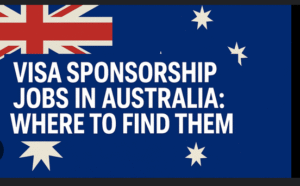
5 Key Strategies to Secure Jobs in Australia with Visa Sponsorship 2025 Guide
Australia remains one of the top destinations for skilled migrants due to its high demand for talent, excellent living standards, and structured visa sponsorship programs. But with increasing competition and evolving immigration rules, it’s essential to approach the job search strategically—especially if you’re aiming for visa sponsorship.
Here are five proven strategies to help you land a job in Australia with visa sponsorship in 2025:
1. Target Occupations on the Skilled Occupation List (SOL)
Australia prioritizes sponsoring foreign workers in industries experiencing talent shortages. The Skilled Occupation List (SOL) is updated regularly and outlines the professions eligible for visa sponsorship.
Top In-Demand Roles (2025):
- Healthcare: Nurses, aged care workers, general practitioners
- IT & Tech: Software developers, cybersecurity analysts, data scientists
- Construction: Civil engineers, electricians, plumbers
- Education: Early childhood and secondary teachers
- Trades: Welders, carpenters, mechanics
Action Tip: Check the latest SOL on the Australian Government’s website and tailor your job search accordingly.
2. Apply Directly to Accredited Sponsoring Employers
Australia has a list of employers who are officially recognized to sponsor foreign workers through visas like:
- Temporary Skill Shortage (TSS) Subclass 482
- Employer Nomination Scheme (ENS) Subclass 186
These employers are familiar with the process and more willing to hire internationally.
Action Tip:
- Use the Registered Sponsors List to verify if a company is authorized.
- Go directly to company websites and apply through their career pages.
- Use keywords like “visa sponsorship” in Australian job sites such as:
3. Tailor Your Resume to Australian Standards
Even if you’re highly qualified, using a resume format unfamiliar to Australian recruiters can hurt your chances. A clear, concise, and well-targeted resume is critical.
What Australian Employers Look For:
- 2–3 pages max
- Strong focus on achievements and results
- No photos or overly personal details
- Include a short summary profile at the top
- List relevant certifications or Australian equivalencies (if any)
Action Tip: Use free tools like Jobscan to optimize your CV for Australian ATS (Applicant Tracking Systems).
4. Leverage LinkedIn and Local Recruiters
Many Australian employers and recruiters actively use LinkedIn to find international talent. A strong, professional profile can get you noticed and even approached with opportunities.
How to Stand Out on LinkedIn:
- Set your location preference to “Open to work in Australia”
- Use keywords like “skilled visa,” “TSS 482,” or “open to sponsorship”
- Join and participate in groups like Australia Jobs Network, Skilled Migrants Australia, or Jobs in Australia with Visa Sponsorship
Also, reach out to recruitment agencies that specialize in international placements, such as:
- Hays Australia
- Robert Walters
- Michael Page
- Healthcare Australia (for nurses and allied health professionals)
5. Choose the Right Visa Pathway and Be Visa-Ready
Employers prefer candidates who already understand the visa process or have begun preparing documents. The most common visas tied to sponsorship are:
- TSS (Subclass 482): Temporary work visa for 2–4 years
- ENS (Subclass 186): Permanent work visa after employer nomination
- Regional Sponsored Migration Scheme (Subclass 494): For regional job placements with PR pathways
Action Tip:
- Gather essential documents early: skills assessment, English test (IELTS/PTE), qualifications, work experience proof.
- Consult the Visa Finder tool to find the best option for your profile.
- Consider State Nomination Programs if you’re open to regional work.
Final Thoughts
Landing a job in Australia with visa sponsorship isn’t just about applying—it’s about applying smart. Focus on your eligible occupation, present yourself professionally, and target employers familiar with the sponsorship process.
If you’re strategic, persistent, and well-prepared, Australia could very well be your next career home.